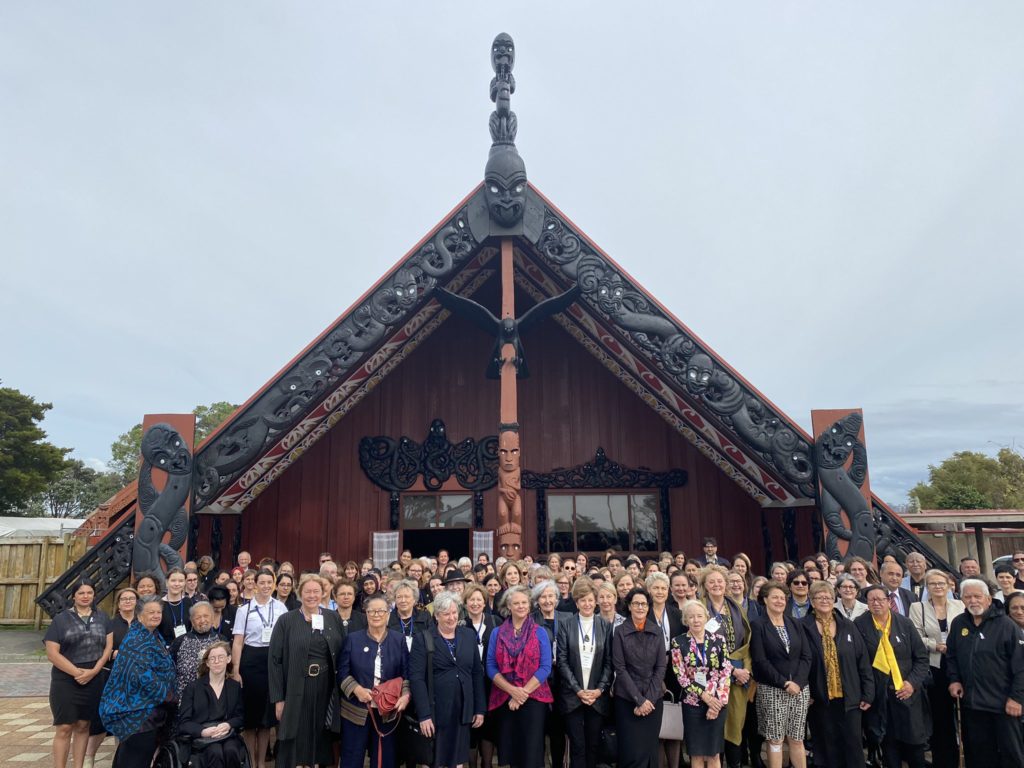Held in Tāmaki Makaurau on 7 – 9 May 2021

It was my pleasure and privilege to attend the International Association of Women Judges (IAWJ) biennial conference, hosted in Tāmaki Makaurau this weekend.
On Friday, we were hosted by Ngāti Whātua Orākei at Orākei marae. Given their history of interaction with tāngata tiriti, which they candidly shared with us, their manaakitanga was a testament to their strength, graciousness and generosity. On Friday afternoon, in the wharenui Tumutumuwhenua, we heard from Sharon Hawke on the history of Ngāti Whātua’s engagement with the legal system, Judge Heemi Taumaunu on Te Ao Marama, his vision for the District Court, and Dr Claire Charters, who gave a clear blueprint for how our courts can recognise that the Crown’s legitimacy is not the exclusive legitimacy in Aotearoa, leaving the courts space and power to also acknowledge the legitimacy of indigenous law in Aotearoa.
Over the rest of the weekend we heard from a wide range of judges, lawyers and academics from all around the world. The topics were many and varied – including sessions on climate change and its disproportionate impacts on women (particularly indigenous women), human trafficking, and refugees. In many of the sessions we heard heartbreaking stories about the challenges of representation of women, and the impact of gender violence and a lack of access to justice. The value of IAWJ as an organisation was clear. The universality of the experiences, but the differences in the specificity of the challenges faced by the women judges around the world was apparent, and it was obvious that an organisation like this, where the women judges can support each other and advocate for each other will provide significant value.
There were many standout sessions. These included a session delivered by four young people, who generously shared so much of themselves, to provide a compelling call to action. Grace Stratton spoke on how she lives with an impairment, but that it is the systems and attitudes of our society that means that she faces disability. It was a challenge to us all, to make sure we are not creating a world that means that the one quarter of our society who live with an impairment cannot fully participate. Pita Roycroft spoke about question of identity – including how at times he has felt a disconnect between his identity as a Māori and Sāmoan person, and his professional and sexual identity, and how he has worked to reconcile these aspects to become comfortable within himself. Sarah Ather spoke about her personal experiences as a Muslim woman in Aotearoa, both before and after the 15 March terrorist attack against the Muslim community. She left us all with the challenge to not again become complacent to the threats faced by some in our society, and to not lose the sense of respect and acceptance that followed the attack. Aigagalefili Fepulea’i (Fili) is a true orator. She spoke of the impact her, her people, and other Pacific people of climate change. Hearing her speak, it is impossible to not feel some of her pain about the impact of climate change, and to come away determined to ensure that our Pacific whānaunga are not abandoned in this fight.
Another fascinating session was on judicial leadership, where a range of women appellate court judges provided their perspectives. This included our own Chief Justice, who spoke about a range of things, including the need for diversity on the bench and training of judges so that they can accurately understand the position of those before them. She also noted that judges need lawyers to bring arguments to them, so that the law can be advanced, and she gave the examples of sentencing of mothers and women, and the prosecution of fraud cases. She also spoke on access to justice, and expressed the view that lawyers owe a duty of service, so we have to be prepared to do some legal aid work, even at the rates currently offered.
Finally, AWLA congratulates Justice Susan Glazebrook for being elected the new President of the IAWJ.
Laura Carter, AWLA President

 May Breakfast Club – Central Auckland
May Breakfast Club – Central Auckland